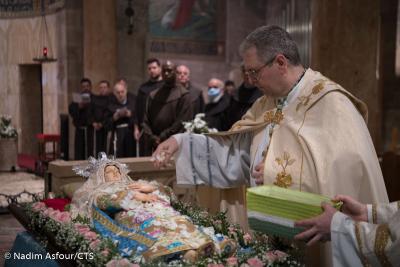Today our prayer wants to be like the one of the Apostles, witnesses on this Holy Mount of Olives of the Ascencion of Our Lord Jesus Christ and in this Kidron Valley of the passage of the Blessed Virgin Mary in body and soul to the life of the new creation.” This is how the vigil of the feast of the Assumption opened in Jerusalem, animated by the Franciscans of the Custody of the Holy Land. The vigil in the garden of Gethsemane on 14th August commemorated the “dormitio” or “transit” of the Blessed Virgin Mary, i.e. the time of her earthly death, even though the actual place of the “transit” of the Blessed Virgin Mary is on Mount Sion where the shrine of “Dormitio Mariae” stands.
“Mary closes her eyes and dies in a context that is human and divine at one and the same time, a familiar, peaceful, beautiful and consoling context; in the context of faith in which even the fear of death is overcome,” said the Custos in his homily -. In this way of dying there is very great dignity and there is the Christian sense of dying. It is a dignity which nowadays we do not always experience, which during the pandemic was lost and which we absolutely have to get back, if we want to recover the human value of this last act of living which is dying. (…) The celebration of the transit of the Blessed Virgin Mary helps us rediscover the value and the dignity of our dying in a human and Christian way, as children of God, who are such because we are believers in the Son of Mary.” A statue of the sleeping Virgin Mary was then taken in a candlelit procession to the Basilica of the Agony in Gethsemane.
In the same church on the morning of the feast of the Assumption, Fr. Francesco Patton, Custos of the Holy Land, presided the solemn mass, in the presence of the friars of the confraternity and a few other faithful. “At the centre of today’s celebration there is the miracle that God performed in the soul and body of Mary,” Fr. Patton said in his homily “The mystery that we are celebrating is the assumption to heaven of Mary in body and soul, not only the entrance of her soul into Paradise.” The Custos then briefly went over the story of the feast-day: it started in Jerusalem where, in the 2nd century, the story of the Virgin Mary’s Dormition or Transit was written down. In the 6th century the solemnity began to be celebrated in Jerusalem and was then extended from East to West with Pope Sergius (a pope of Syrian origin of the 7th century). It was then Pope Pius XII who, in 1950, proclaimed the dogma of the Assumption of Mary into heaven in body and soul.
“Mary is really for us a sign of hope and of consolation,” said Fr. Patton, “she shows us that, if we follow Christ on earth, we will also follow him in Heaven, if we welcome him in this life, he will welcome us in the next one, not as mutilated souls of our bodies, but as people who take part wholly and fully in the life of God.” A statue of the Virgin Mary was taken in procession in the garden of Gethsemane to the singing of the Lauretan Litanies.
In the afternoon of 15th August, the Franciscans led the prayer of Vespers in the grotto of the garden of Gethsemane and then entered Mary’s tomb in a procession, welcomed by the representatives of the Greek Orthodox and Armenian communities. It is the only time in the year that the Franciscans can officially enter that place, according to the Status Quo. Singing to the Virgin, those present knelt one by one in front of the Mother of Jesus. The Custos concluded: “At times like the ones we are living in, struck daily by the claws of death, let us also grasp on to the cord that Mary dropped to Thomas and let us look into the empty tomb to be certain that Jesus overcame death not only for himself. Not only for his Mother, but also for each and every one of us.”
By: Beatrice Guarrera
Source: custodia.org






